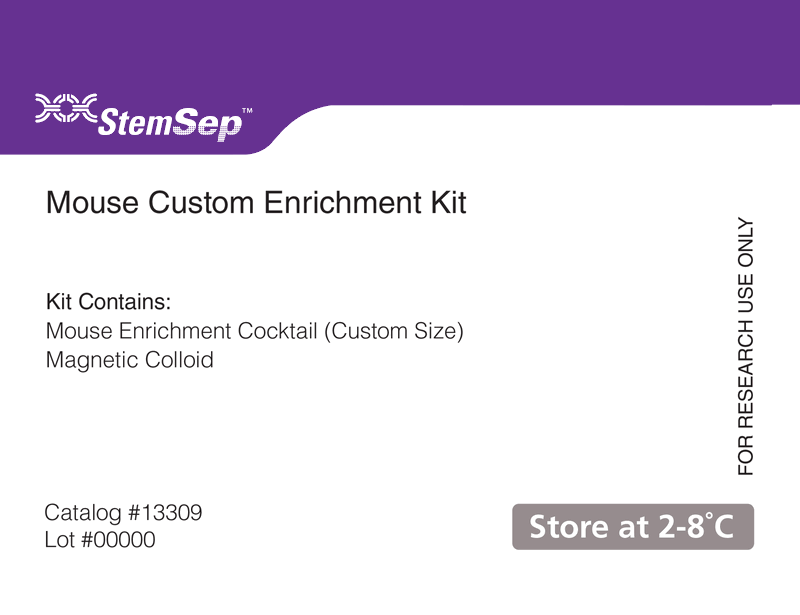StemSep™ Mouse Custom Enrichment Kit
Immunomagnetic Column-Based Negative Selection Kit
概要
The StemSep™ Mouse Custom Enrichment Kit is designed to isolate any mouse cells from single cell suspensions of splenocytes or other tissues by negative selection. STEMCELL Technologies offers a wide selection of antibodies for custom separation and will work with you to isolate a cell type of interest. Please contact our technical support team at techsupport@stemcell.com for more information.
Components
-
StemSep™ Mouse Custom Enrichment Kit (Catalog #13309)
- StemSep™ Mouse Custom Enrichment Cocktail
- StemSep™ Magnetic Colloid
Contains
Magnet Compatibility
• StemSep™ Magnet (Catalog #11030, 11050, 11060 11070) or a magnet with the strength of at least 0.5 Tesla
• StemSep™ Negative Selection Columns
Subtype
Cell Isolation Kits
Cell Type
B Cells, Dendritic Cells, Granulocytes and Subsets, Hematopoietic Stem and Progenitor Cells, Macrophages, Marrow Stromal Cells, Mesenchymal Stem and Progenitor Cells, Monocytes, Mononuclear Cells, Myeloid Cells, NK Cells, Other, Plasma, T Cells
Species
Mouse
Sample Source
Other, Spleen
Selection Method
Negative
Application
Cell Isolation
Brand
StemSep
Area of Interest
Immunology, Stem Cell Biology
技术资料
| Document Type | 产品名称 | Catalog # | Lot # | 语言 |
|---|---|---|---|---|
| Manual | StemSep™ Mouse Custom Enrichment Kit | 13309 | All | English |
| Safety Data Sheet 1 | StemSep™ Mouse Custom Enrichment Kit | 13309 | All | English |
| Safety Data Sheet 2 | StemSep™ Mouse Custom Enrichment Kit | 13309 | All | English |
数据及文献
Publications (1)
Journal of immunology (Baltimore, Md. : 1950) 2006 JUL
A role for DNA hypomethylation and histone acetylation in maintaining allele-specific expression of mouse NKG2A in developing and mature NK cells.
Abstract
Abstract
The repertoire of receptors that is expressed by NK cells is critical for their ability to kill virally infected or transformed cells. However, the molecular mechanisms that determine whether and when NK receptor genes are transcribed during hemopoiesis remain unclear. In this study, we show that hypomethylation of a CpG-rich region in the mouse NKG2A gene is associated with transcription of NKG2A in ex vivo NK cells and NK cell lines. This observation was extended to various developmental stages of NK cells sorted from bone marrow, in which we demonstrate that the CpGs are methylated in the NKG2A-negative stages (hemopoietic stem cells, NK progenitors, and NKG2A-negative NK cells), and hypomethylated specifically in the NKG2A-positive NK cells. Furthermore, we provide evidence that DNA methylation is important in maintaining the allele-specific expression of NKG2A. Finally, we show that acetylated histones are associated with the CpG-rich region in NKG2A positive, but not negative, cell lines, and that treatment with the histone deacetylase inhibitor trichostatin A alone is sufficient to induce NKG2A expression. Treatment with the methyltransferase inhibitor 5-azacytidine only is insufficient to induce transcription, but cotreatment with both drugs resulted in a significantly greater induction, suggesting a cooperative role for DNA methylation and histone acetylation status in regulating gene expression. These results enhance our understanding of the formation and maintenance of NK receptor repertoires in developing and mature NK cells.


